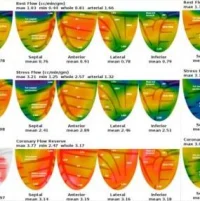Carotid arteries are the two major arteries on either side of the neck that carry blood into the head and brain. New research shows that MRI scans of carotid artery wall thickness provide a better way to predict risk of cardiovascular disease, compared to the current carotid intima-media thickness (IMT) test using ultrasound.
Similar to coronary arteries, carotids can become narrowed with plaque buildup, a process known as atherosclerosis. Previous studies have shown that plaque buildup in the carotid arteries often mirrors that in the coronary arteries. Since carotids are more easily imaged, this makes them useful vessels for the assessment of the risk of strokes, heart attacks and other adverse cardiovascular events.
Currently, ultrasound IMT is the most widely used imaging method to level of early-stage carotid atherosclerosis. There is evidence showing that IMT offers only minor improvement in cardiovascular disease risk prediction when added to the Framingham risk score, a commonly used measure that takes into account factors like cholesterol, smoking and family history.
Vessel wall MRI is a promising, noninvasive technique that can image the entire carotid wall circumference, in contrast to ultrasound measurements of IMT that are usually based solely on views of the artery's far wall, according to the new research published in the journal Radiology.
Moreover, MRI can also see all three layers of the artery, including the adventitia, the outermost layer not visible on IMT. As study lead author Bruce A. Wasserman, MD, explains: "High-resolution MRI can tell us the stage of plaque in the wall and tell us about plaque features that could lead to stroke. It can also see the adventitia, a vessel layer that may have an important role in cardiovascular risk because small vessels proliferate there, leading to thickening of the artery, which may be responsible for early disease development and progression."
Dr. Wasserman, from Johns Hopkins University School of Medicine in Baltimore, and co-researchers conducted the new study to determine whether carotid artery wall thickness measurements increase risk of coronary heart disease and stroke. From July 2000 to December 2013, the researchers enrolled 698 men and women from the Multi-Ethnic Study of Atherosclerosis (MESA), a major, long-running project involving six major research centres around the U.S.
Study participants (between 45 to 84 years old with a mean age of 63) had no known history of cardiovascular disease. The participants underwent ultrasound and MRI between 2000 and 2004 to compare carotid artery wall thickness. During subsequent follow-up, the researchers observed the association between wall thickness and cardiovascular events was stronger with both noncontrast and contrast-enhanced MRI than it was for IMT.
"What we saw was surprising," Dr. Wasserman said. "MRI measures of carotid artery wall thickness were more consistently associated with cardiovascular events than was intima-media thickness using ultrasound. This tells us that perhaps MRI could be a better predictor of cardiovascular events, especially stroke."

Image: Common carotid artery (CCA) wall thickness assessment in a 62-year-old man by using, A, ultrasound and, B, MRI.
Dr. Wasserman cautioned that more research is needed to define how much MRI can add to the predictive models currently in use. MRI is expensive and would be impractical as a stand-alone measure of cardiovascular risk, but it could have a role in providing critical supplementary information for some patients.
Further studies are planned with the newer technology and in larger population groups.
Image Credit: Radiological Society of North America
Latest Articles
cardiovascular disease, Carotid artery MRI, carotid intima-media thickness test
Carotid arteries are the two major arteries on either side of the neck that carry blood into the head and brain. New research shows that MRI scans of carotid artery wall thickness provide a better way to predict risk of cardiovascular disease, compared to








